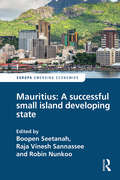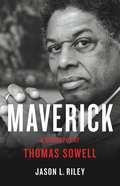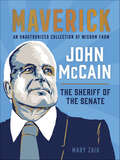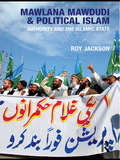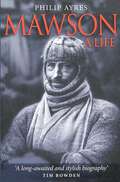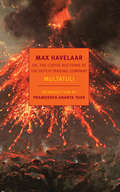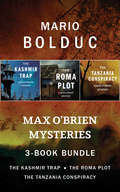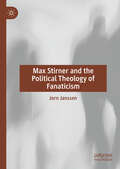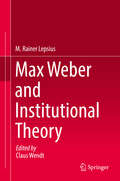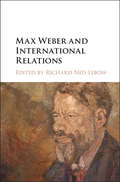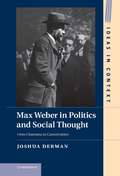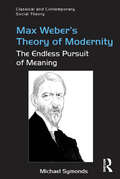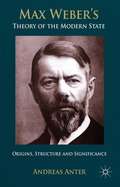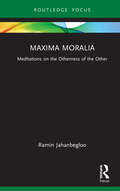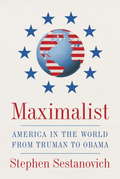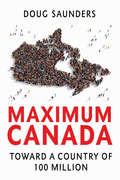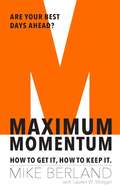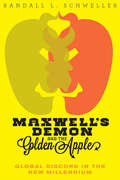- Table View
- List View
Mauritius: A successful Small Island Developing State (Europa Perspectives: Emerging Economies)
by Robin Nunkoo Boopen Seetanah Raja Vinesh SannasseeThe economic upturn and performance of Mauritius is a far cry from predictions made in the 1960s. The island’s remarkable economic performance since the 1980s can been attributed to a multitude of factors instrumental to the success of the economy, including structural reforms, outward looking export orientated strategies, diversification in the manufacturing, tourism and financial services sectors amongst others, sound economic governance and institutions, and significant investment in human capital. This book attempts to provide a detailed analysis of the various key ingredients which have helped to propel Mauritius to its current status. The various chapters provide important readings for both academics and policymakers, with the final chapter providing key policy strategies which the government needs to implement to help Mauritius graduate to the next level of development: namely to that of a high-income economy and, in moving out of the middle-income trap, laying the foundations for future growth and shared prosperity in the light of both domestic challenges and global constraints.
Maverick: A Biography of Thomas Sowell
by Jason L RileyA biography of Thomas Sowell, one of America's most influential conservative thinkers.Thomas Sowell is one of the great social theorists of our age. In a career spanning more than a half century, he has written over thirty books, covering topics from economic history and social inequality to political theory, race, and culture. His bold and unsentimental assaults on liberal orthodoxy have endeared him to many readers but have also enraged fellow intellectuals, the civil-rights establishment, and much of the mainstream media. The result has been a lack of acknowledgment of his scholarship among critics who prioritize political correctness.In the first-ever biography of Sowell, Jason L. Riley gives this iconic thinker his due and responds to the detractors. Maverick showcases Sowell's most significant writings and traces the life events that shaped his ideas and resulted in a Black orphan from the Jim Crow South becoming one of our foremost public intellectuals.
Maverick: An Unauthorized Collection of Wisdom from John McCain, the Sheriff of the Senate
by Mary ZaiaA lifetime of wisdom from a true American patriotThe country is more polarized than it has been for decades, but John McCain is the rare public figure who has earned the respect of colleagues and constituents on both sides of the aisle. A model for bipartisanship and political integrity, in his forty years in politics McCain has never been afraid to buck trends or ruffle a few feathers. His words are more important today than ever.Sample quotes:“In prison, I fell in love with my country.”“Nothing in life is more liberating than to fight for a cause larger than yourself, something that encompasses you but is not defined by your existence alone.”“Americans never quit. We never surrender. We never hide from history. We make history.”“It is your character, and your character alone, that will make your life happy or unhappy.”
Mawlana Mawdudi and Political Islam: Authority and the Islamic state
by Roy JacksonMawlana Mawdudi was one of the most influential and important Islamic thinkers of the modern world, whose brand of political Islam has won widespread acceptance in South and South East Asia as well as the Middle East. He was not only an Islamic scholar, but also a journalist and political activist who founded the Jama’at-i-Islami, which has subsequently influenced the development of many Islamic movements and parties throughout the Muslim world. This book is the first to critically engage and assess his career and legacy within the wider context of political Islam. It includes coverage of his early life and influences, and examines his considerable influence in the contemporary Islamic world. The issues that were a concern for Mawdudi and continue to have resonance for our world today include such questions as the role of women in Islam, the possibilities for democracy in an Islamic state, the importance of jihad, and the moral and religious responsibility of the individual. Whilst focus is on Mawdudi’s life and writings, this is placed within the wider context of topical, often contentious, Islamic thought. Providing an up-to-date and detailed critical study of Mawlana Mawdudi and many issues surrounding political Islam both in his time and today, this book will be an important text for scholars of Islamic Studies, Political Science and Philosophy.
Mawson: A Life
by Philip AyresSir Douglas Mawson was Australia's pre-eminent Antarctic explorer, a tall, quiet scientist who survived several gruelling polar expeditions, and went on to play a notable role in the academic and research establishment.He is most famed for an ill-fated expedition in 1913, in which he trekked hundreds of kilometres alone, without supplies, after his two companions perished. But he was also the main architect of Australia's official Antarctic presence in the first half of the twentieth century, instrumental in the Australian Government's decision to claim part of Antarctica, and in the founding of Australia's major organization for Antarctic exploration and research.Philip Ayres' life of Mawson is the definitive biography of the polar explorer, who died in 1958. In this richly researched and well-illustrated work, he paints a picture of a man who was a brave and resourceful hero, but also a deeply flawed personality.
Max Havelaar: Or, the Coffee Auctions of The Dutch Trading Company (Library Of The Indies)
by MultatuliA fierce indictment of colonialism, Max Havelaar is a masterpiece of Dutch literature based on the author's own experience as an adminstrator in the Dutch East Indies in the 1850s.A brilliantly inventive fiction that is also a work of burning political outrage, Max Havelaar tells the story of a renegade Dutch colonial administrator’s ultimately unavailing struggle to end the exploitation of the Indonesian peasantry. Havelaar’s impassioned exposé is framed by the fatuous reflections of an Amsterdam coffee trader, Drystubble, into whose hands it has fallen. Thus a tale of the jungles and villages of Indonesia is interknit with one of the houses and warehouses of bourgeois Amsterdam where the tidy profits from faraway brutality not only accrue but are counted as a sign of God’s grace. Multatuli (meaning “I have suffered greatly”) was the pen name of Eduard Douwes Dekker, and his novel caused a political storm when it came out in Holland. Max Havelaar, however, is as notable for its art as it is for its politics. Layering not only different stories but different ways of writing—including plays, poems, lists, letters, and a wild accumulation of notes—to furious, hilarious, and disconcerting effect, this masterpiece of Dutch literature confronts the fixities of power with the protean and subversive energy of the imagination.
Max O'Brien Mysteries 3-Book Bundle: The Kashmir Trap / The Roma Plot / The Tanzania Conspiracy (A Max O'Brien Mystery #3)
by Mario BolducIt’s not easy to have enemies everywhere … but con artist Max O’Brien is a man of the world. Read all three of Max's adventures in this special ebook collection. The Kashmir Trap — Book #1 Professional con man Max O’Brien is on the run from police when he learns that his diplomat nephew has been assassinated in New Delhi. Eleven years earlier, Max’s brother mysteriously disappeared while serving as an ambassador. Determined to find answers this time, Max goes to India, on the verge of war with Pakistan, to unravel a violent past. The Roma Plot — Book #2 When con man Max O’Brien hears that one of his best friends is wanted for the murder of twenty-three people in Romania, he heads to Bucharest to uncover the truth. As Max uncovers secrets reaching back to Europe’s darkest days, he ends up with one foot in the present and the other in the past, scrambling to save his friend?s future. The Tanzania Conspiracy — Book #3 Max O’Brien travels to Tanzania to solve a friend’s murder, but finds himself wrapped up in the murky history of a killing spree of African albinos, and facing the possibility that his friend may have been collateral damage of a gruesome slaughter. Could the connection be real? Even in the face of horror, Max will stop at nothing to find out.
Max Schmeling und die Entstehung eines Nationalhelden in Deutschland im zwanzigsten Jahrhundert
by Jon HughesDieses Buch ist die erste umfassende Studie über den deutschen Boxer Max Schmeling (1905-2005) als Nationalheld und Repräsentationsfigur in Deutschland zwischen den 1920er Jahren und der Gegenwart. Es untersucht die komplexen Beziehungen zwischen Sport, Kultur, Politik und nationaler Identität und stützt sich dabei auf ein Jahrhundert von Journalismus, Film, bildender Kunst, Lebensberichten und Belletristik. Detaillierte Kapitel analysieren Schmelings Aufstieg zur Ikone in der Weimarer Republik, seine Verbindung zu Amerika, seinen Prominentenstatus im Dritten Reich und seine Rivalität mit Joe Louis als Mittelpunkt eines außergewöhnlichen propagandistischen und ideologischen Wettstreits. Das Buch untersucht auch, wie Schmelings geschäftlicher Erfolg in der Nachkriegszeit ihn mit der Kultur der "Stunde Null" in der Ära des "Wirtschaftswunders" in Verbindung brachte und wie er später als "guter Deutscher" und moralisches Beispiel für eine Nachkriegsgeneration von Deutschen, die entschlossen waren, die Vergangenheit zu "bewältigen", in Anspruch genommen wurde. Das Buch richtet sich an Leser, die sich für die Geschichte des Sports und des Boxens, für Sportdiskurse und politische Kultur sowie für Fragen der nationalen Identität in der modernen deutschen Geschichte interessieren.
Max Stirner and the Political Theology of Fanaticism
by Jorn JanssenThis book provides a rigorous and insightful exploration of political fanaticism, guided by a nuanced interpretation of the works of Max Stirner, a philosopher often overlooked in contemporary discourse. Based on a comprehensive analysis of Stirner's perspectives, the book sheds light on the phenomenon of political fanaticism and its implications for modern society. Defined as an intense and irrational emotional investment in political convictions, political fanaticism permeates both North American and European contexts, presenting a significant area of study within political theory. The aim of this work is not to advocate for any particular ideological position but rather to critically examine the phenomenon itself. Central to the investigation is Stirner's distinctive idea that political fanaticism mirrors the fervor of religious zealotry transposed onto the political stage. By delving into Stirner's philosophical insights, the book aims to elucidate the underlying mechanisms driving political fanaticism and its relationship to broader societal shifts. Contributing to the field of political theology by exploring the intersections between politics and religious belief systems, the aim is to achieve a deeper understanding of the complex dynamics at play in contemporary political discourse. Ultimately, the goal is to provide scholars and researchers with a comprehensive framework for analyzing and contextualizing political fanaticism within the broader landscape of modern politics. By engaging with Stirner's works and interrogating their relevance to contemporary challenges, the book seeks to enrich scholarly discourse and foster critical reflection on this pressing issue.
Max Weber and Institutional Theory
by M. Rainer LepsiusClaus WendtThis book presents a collection of essays on institutional theory written by the German sociologist and Weber-expert M. Rainer Lepsius. Based on Weber’s work, the author develops concepts of institutional theory, which he subsequently applies to topics such as National Socialism, democratization processes, German unification, and the institutionalization of the European Union. By showing how charismatic leadership can under certain circumstances threaten democratic structures and curtail individual freedoms, and by analyzing the structural and cultural conditions under which people develop trust in political and social structures and ultimately come to support and comply with them, the author provides a sound analytical understanding of the development of democratic institutions and a democratic political culture. This collection of essays was edited, translated and commented on by Claus Wendt.
Max Weber and International Relations
by Lebow Richard NedMax Weber explored the political, epistemological and ethical problems of modernity, and understood how closely connected they were. His efforts are imaginative, sophisticated, even inspiring, but also flawed. Weber's epistemological successes and failures highlight unresolvable tensions that are just as pronounced today and from which we have much to learn. This edited collection of essays offers novel readings of Weber's politics, approach to knowledge, rationality, counterfactuals, ideal types, power, bureaucracy, the state, history, and the non-Western world. The conclusions look at how some of his prominent successors have addressed or finessed the tensions of the epistemological between subjective values and subjective knowledge; the sociological between social rationalization and irrational myths; the personal among conflicting values; the political between the kinds of leaders democracies select and the national tasks that should be performed; and the tragic between human conscience and worldly affairs.
Max Weber in Politics and Social Thought: From Charisma to Canonization
by Joshua DermanMax Weber is widely regarded as one of the foundational thinkers of the twentieth century. But how did this reclusive German scholar manage to leave such an indelible mark on modern political and social thought? Max Weber in Politics and Social Thought is the first comprehensive account of Weber's wide-ranging impact on both German and American intellectuals. Drawing on a wide range of sources, Joshua Derman illuminates what Weber meant to contemporaries in the Weimar Republic and Nazi Germany and analyzes why they reached for his concepts to articulate such widely divergent understandings of modern life. The book also accounts for the transformations that Weber's concepts underwent at the hands of émigré and American scholars, and in doing so, elucidates one of the major intellectual movements of the mid-twentieth century: the transatlantic migration of German thought.
Max Weber's Theory of Modernity: The Endless Pursuit of Meaning (Classical and Contemporary Social Theory)
by Michael SymondsThis book illuminates an important dimension of the work of Max Weber. Weber’s theory of meaning and modernity is articulated through an understanding of his account of the way in which the pursuit of meaning in the modern world has been shaped by the loss of Western religion and how such pursuit gives sense to the phenomena of human suffering and death. Through a close, scholarly reading of Weber’s extensive writings and Vocation Lectures, the author explores the concepts of ’paradox’ and ’brotherliness’ as found in Weber’s work, in order to offer an original exposition of Weber’s actual theory of how meaning and meaninglessness work in the modern world. In addition to making a substantial and highly original contribution to the sociology of modernity, the book applies the theory of meaning extracted from Weber’s thought, addressing the claim that Weber’s work has been rendered out-dated by the supposed re-enchantment of the modern world, as well as discussing the ways this theory can contribute to our understanding of the development of specific forms of modernity. A rigorous examination of the thought of one of the most important figures in classical sociology, this volume will appeal to scholars of sociology, social theory and philosophy with interests in modernity, Weber and the concept of meaning.
Max Weber’s Theory of the Modern State
by Andreas AnterAndreas Anter reconstructs Max Weber's theory of the modern state, showing its significance to contemporary political science. He reveals the ambivalence of Weber's political thought: the oscillation between an #65533;tatiste position, mainly oriented to the reason of state, and an individualistic one, focussed on the freedom of individuals
Max for President
by Jarrett J. KrosoczkaFrom the author of National Book Award finalist Hey, Kiddo.Max thinks that he would like to be class president. So does Kelly. But there can only be one president! Who will the class elect? Full of laughs and suspense, Max for President is a lively story of good sportsmanship—and a great way for kids to learn a little about elections, too!
Maxima Moralia: Meditations on the Otherness of the Other
by Ramin JahanbeglooThis book highlights the problem of one-dimensional, reductionistic life of the modern individual. An expression of crisis in our world, it discusses the imperative need to have a more comprehensive, non-reductionist life where the Other is incorporated, especially the relationship between the Other and the Self, based on virtues like love, empathy, equality, and compassion. The volume sheds light on how the world has forgone the art of living for a mutilated sense of well-being, the rise of conformity and complacency in human thought, and the lack of democratic dissent and citizenry responsibility in our contemporary societies, which is now characterized by mass immaturity, propelled by a process of thoughtlessness. It discusses how humans need to be aware of the life they lead, to think about Otherness of the Other not just as another virtue but also as a crucial element in the survival of humanity, for people to coexist with the world around them as equals. Furthermore, it advocates meaningful and thoughtful existence, in touch with the Nature we coexist with, to ensure that humanity is not robbed of its noble spirit as we live to survive in our techno-capitalist societies. An introspective read, this book will be of great interest to scholars and researchers of moral and ethical philosophy, political philosophy, and political science.
Maximalist
by Stephen SestanovichFrom a writer with long and high-level experience in the U.S. government, a startling and provocative assessment of America's global dominance. Maximalist puts the history of our foreign policy in an unexpected new light, while drawing fresh, compelling lessons for the present and future. When the United States has succeeded in the world, Stephen Sestanovich argues, it has done so not by staying the course but by having to change it--usually amid deep controversy and uncertainty. For decades, the United States has been a power like no other. Yet presidents and policy makers worry that they--and, even more, their predecessors--haven't gotten things right. Other nations, they say to themselves, contribute little to meeting common challenges. International institutions work badly. An effective foreign policy costs too much. Public support is shaky. Even the greatest successes often didn't feel that way at the time. Sestanovich explores the dramatic results of American global primacy built on these anxious foundations, recounting cycles of overcommitment and underperformance, highs of achievement and confidence followed by lows of doubt. We may think there was a time when America's international role reflected bipartisan unity, policy continuity, and a unique ability to work with others, but Maximalist tells a different story--one of divided administrations and divisive decision making, of clashes with friends and allies, of regular attempts to set a new direction. Doing too much has always been followed by doing too little, and vice versa. Maximalist unearths the backroom stories and personalities that bring American foreign policy to life. Who knew how hard Lyndon Johnson fought to stay out of the war in Vietnam--or how often Henry Kissinger ridiculed the idea of visiting China? Who remembers that George Bush Sr. found Ronald Reagan's diplomacy too passive--or that Bush Jr. considered Bill Clinton's too active? Leaders and scoundrels alike emerge from this retelling in sharper focus than ever before. Sestanovich finds lessons in the past that anticipate and clarify our chaotic present. From the Hardcover edition.
Maximize Your Medicare: Qualify for Benefits, Protect Your Health, and Minimize Your Costs
by Jae Oh"Jae Oh&’s Maximize Your Medicare is the best book I&’ve read on understanding all of the Medicare options and how Medicare intersects with other health insurance options." —Wade Pfau, Professor of Retirement Income at The American CollegeIncludes the Most Up-to-Date Information for 2022-2023 Confused by Medicare? Get answers from Maximize Your Medicare, an informative guide by nationally recognized expert Jae W. Oh. Maximize Your Medicare helps readers understand how and what to choose when deciding on Medicare options. This book shows readers how to: Enroll in Medicare and avoid never-ending penaltiesCompare Medigap vs. Medicare AdvantageDiscern the differences among Parts A, B, and DIncrease benefits every yearAvoid costly errorsDeal with special circumstancesGet the most from the plan Additional information for this new edition includes: Putting it Together: the steps you need to take to be a Savvy Medicare ConsumerNew coverage options for Diabetes and End-Stage Renal Disease patientsHow the ACA enhancements can change your retirement decision-making path Written in a clear and concise style, Maximize Your Medicare is a vital resource for every American aged sixty-five or older, as well as for their families and care coordinators. ged sixty-five or older, as well as for their families and care coordinators.
Maximize Your Medicare: Qualify for Benefits, Protect Your Health, and Minimize Your Costs
by Jae Oh"A must-read for both current and future retirees." —Robert Powell, Retirement Daily Includes the Most Up-to-Date Information for 2020-2021Confused by Medicare? Get answers from Maximize Your Medicare,an informative guide by nationally recognized expert Jae W. Oh. Maximize Your Medicare helps readers understand how and what to choose when deciding on Medicare options. This book shows readers how to:Enroll in Medicare and avoid never-ending penalties Compare Medigap vs. Medicare Advantage Discern the differences among Parts A, B, and DIncrease benefits every yearAvoid costly errorsDeal with special circumstances Get the most from the planWritten in a clear and concise style, Maximize Your Medicare is a vital resource for every American aged sixty-five or older, as well as for their families and care coordinators.
Maximize Your Medicare: Qualify for Benefits, Protect Your Health, and Minimize Your Costs
by Jae Oh"Jae Oh&’s Maximize Your Medicare is the best book I&’ve read on understanding all of the Medicare options and how Medicare intersects with other health insurance options." —Wade Pfau, Professor of Retirement Income at The American CollegeIncludes the Most Up-to-Date Information for 2024-2025 Confused by Medicare? Get answers from Maximize Your Medicare, an informative guide by nationally recognized expert Jae W. Oh. Maximize Your Medicare helps readers understand how and what to choose when deciding on Medicare options. This book shows readers how to: Enroll in Medicare and avoid never-ending penalties Compare Medigap vs. Medicare Advantage Discern the differences among Parts A, B, and D Increase benefits every year Avoid costly errors Deal with special circumstances Get the most from the plan Additional information for this new edition includes: Putting it Together: the steps you need to take to be a Savvy Medicare Consumer New coverage options for Diabetes and End-Stage Renal Disease patients How the ACA enhancements can change your retirement decision-making path Written in a clear and concise style, Maximize Your Medicare is a vital resource for every American aged sixty-five or older, as well as for their families and care coordinators. ged sixty-five or older, as well as for their families and care coordinators.
Maximizing Damages in Small Personal Injury Cases
by Ellsworth RundlettMaximizing Damages in Small Personal Injury Cases Making a decent return on small cases is getting harder. The cost to process them keeps rising, while insurers and jurors are reducing settlements and awards. Here is help. Maximizing Damages in Small Personal Injury Cases equips you with the tools you need to screen, document, negotiate, and settle or litigate your smaller cases. In addition to practical guidelines and techniques, the book offers more than 100 custom-drafted checklists and pattern-specific forms to help reduce your time and costs. These short, simple forms are specifically tailored for small cases: * Liability checklists * Interrogatories * Deposition checklists * Adjuster letters * Motions * Trial preparation checklists * Even public relations letters
Maximum Canada: Why 35 Million Canadians Are Not Enough
by Doug SaundersTo face the future, Canada needs more Canadians. But why and how many? Canada’s population has always grown slowly, when it has grown at all. That wasn’t by accident. For centuries before Confederation and a century after, colonial economic policies and an inward-facing world view isolated this country, attracting few of the people and building few of the institutions needed to sustain a sovereign nation. In fact, during most years before 1967, a greater number of people fled Canada than immigrated to it. Canada’s growth has faltered and left us underpopulated ever since. At Canada’s 150th anniversary, a more open, pluralist and international vision has largely overturned that colonial mindset and become consensus across the country and its major political parties. But that consensus is ever fragile. Our small population continues to hamper our competitive clout, our ability to act independently in an increasingly unstable world, and our capacity to build the resources we need to make our future viable. In Maximum Canada, a bold and detailed vision for Canada’s future, award-winning author and Globe and Mail columnist Doug Saunders proposes a most audacious way forward: to avoid global obscurity and create lasting prosperity, to build equality and reconciliation of indigenous and regional divides, and to ensure economic and ecological sustainability, Canada needs to triple its population.
Maximum Likelihood for Social Science: Strategies for Analysis (Analytical Methods for Social Research)
by John S. Ahlquist Michael D. WardThis volume provides a practical introduction to the method of maximum likelihood as used in social science research. Ward and Ahlquist focus on applied computation in R and use real social science data from actual, published research. Unique among books at this level, it develops simulation-based tools for model evaluation and selection alongside statistical inference. The book covers standard models for categorical data as well as counts, duration data, and strategies for dealing with data missingness. By working through examples, math, and code, the authors build an understanding about the contexts in which maximum likelihood methods are useful and develop skills in translating mathematical statements into executable computer code. Readers will not only be taught to use likelihood-based tools and generate meaningful interpretations, but they will also acquire a solid foundation for continued study of more advanced statistical techniques.
Maximum Momentum: How To Get It, How To Keep It
by Mike BerlandDo you wonder why some ideas go viral and others sink? Why one political candidate soars while another fails to gain traction? Why one product becomes an instant rage, while its competitor struggles to stay above water? What is the secret to momentum? Many people believe that momentum is driven by emotion and is unpredictable, but as Mike Berland, the internationally recognized pollster and strategic advisor, has discovered, it&’s actually a science, with easily analyzed metrics. In Maximum Momentum: How to Get It, How to Keep It, Berland reveals the key to momentum, beginning with the simple physics formula— mass x velocity. He then develops a Momentum Matrix—five signals that decode the science into effective measures. Maximum Momentum is a lively examination of hot trends in the current arena—from politics to society to business to sports. Using colorful graphics to underscore the stories, Berland examines the people, issues, movements and products that most captivate Americans.
Maxwell's Demon and the Golden Apple: Global Discord in the New Millennium
by Randall L. SchwellerMixing myth, entropy, and Angry Birds, Randall Schweller brings a novel perspective to international studies.Just what exactly will follow the American century? This is the question Randall L. Schweller explores in his provocative assessment of international politics in the twenty-first century.Schweller considers the future of world politics, correlating our reliance on technology and our multitasking, distracted, disorganized lives with a fragmenting world order. He combines the Greek myth of the Golden Apple of Discord, which explains the start of the Trojan War, with a look at the second law of thermodynamics, or entropy. "In the coming age," Schweller writes, "disorder will reign supreme as the world succumbs to... entropy, an irreversible process of disorganization that governs the direction of all physical changes taking place in the universe." Interweaving his theory of global disorder with issues on the world stage—coupled with a disquisition on board games and the cell phone app "Angry Birds"—Schweller’s thesis yields astonishing insights. Maxwell’s Demon and the Golden Apple will appeal to leaders of multinational corporations and government programs as well as instructors of undergraduate courses in international relations.
